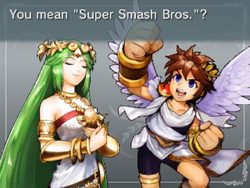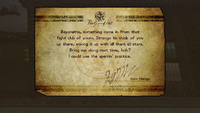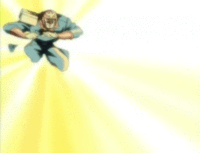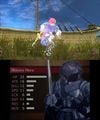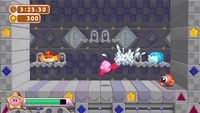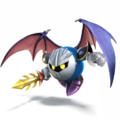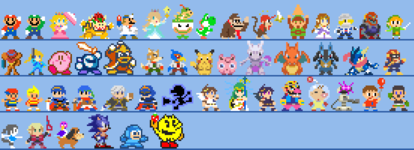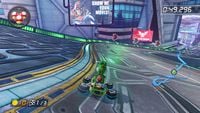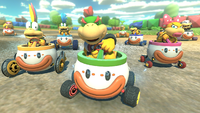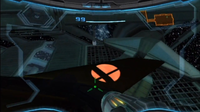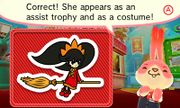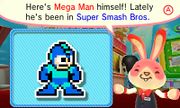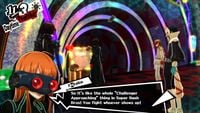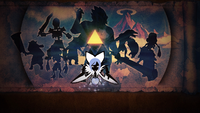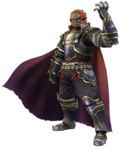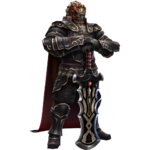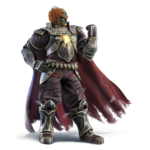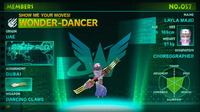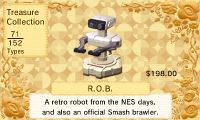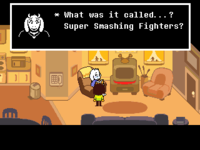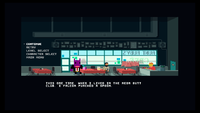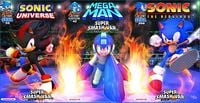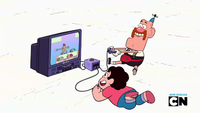List of Super Smash Bros. references in other franchises
From SmashWiki, the Super Smash Bros. wiki
Jump to navigationJump to search
As the Super Smash Bros. series is a crossover of numerous existing Nintendo properties, some of the properties represented have since made references to the series in their "native" media. This is a list of all known references to Super Smash Bros. outside of the series itself.
Represented franchises
These are references from franchises directly represented in Smash.
General
- Arguably, any game with support from the Super Smash Bros. line of amiibo references Smash to some degree due to its roster affecting the availability of a character as an amiibo. This is especially true for those with specific functions only available from Smash amiibo. For instance, some amiibo-based Yoshi designs in Yoshi's Woolly World, such as those based on characters like Shulk or Sonic the Hedgehog, are only available through usage of their Smash amiibo. A full list of games compatible with Smash amiibo can be found here.
Animal Crossing
File:ACNLWA Villager statue.jpg
Statue of the Smash Villager design in Animal Crossing: New Leaf - Welcome amiibo.
- In Animal Crossing, some of the codes that the player can give to Tom Nook in exchange for items are altered versions of Nintendo game titles. A few of these codes are based on the title "Super Smash Bros.", such as "MupersmaspbnoS SupersmashbroS" for the Ponderosa Bonsai. A full list of codes can be found here.
- In Animal Crossing: New Leaf, the player can win prizes by redeeming fortunes they receive from a fortune cookie. These prizes are items and clothing from other Nintendo games, and if the player wins the Blue Falcon furniture item, the fortune reads "When all else fails, never forget to show them your moves." in reference to Captain Falcon's famous taunt in the Super Smash Bros. series.
- Animal Crossing games released after SSB4 feature compatibility with the Villager amiibo. In Animal Crossing: amiibo Festival, a golden statue of the Villager's SSB4 design and pose is added to the plaza. In Animal Crossing: Happy Home Designer and the Animal Crossing: New Leaf - Welcome amiibo update, the player gains access to the same statue for use in designing rooms. In Animal Crossing: New Horizons, the player is able to order a poster featuring artwork of the male player character with his slightly altered appearance as seen in his SSBU spirit.
Bayonetta
- In the Nintendo Switch port of Bayonetta 2, scanning amiibo give special messages from Rodin to Bayonetta. While Peach, Daisy, Samus, Fox, and Link amiibo are specific to the character (as they unlock the outfits previously featured in the Wii U version), other amiibo provide generic messages. One message in particular, provided by any other Super Smash Bros. series amiibo, has Rodin mention a gift coming in from "that fight club of [hers]", and remarks how it's "strange to think of [her] up there, mixing it up with all them all-stars." Rodin also asks Bayonetta to "bring [him] along next time"; indeed, Rodin would go on to appear in Ultimate as an Assist Trophy.
Banjo-Kazooie
- Banjo-Kazooie: Nuts & Bolts contains a reference to the Super Smash Bros. series. In the game's final scenes, when Gruntilda is shown working in the Lord of Games' ("L.O.G." for short) Videogame Factory as punishment for losing against Banjo & Kazooie, in the background are several packages pertaining to fictional games that parody existing titles, such as "Cake Filler Instinct" (a reference to Rare's Killer Instinct series), and "Viva Piñata Kart" (a reference to the Mario Kart series as well as Rare's Viva Piñata series). One of these games is "Banjo-Kazooie Bash Buddies," a nod to the Smash Bros. franchise.
Chibi-Robo!
- In Chibi-Robo! Zip Lash, figurines can be unlocked of Chibi-Robo in various poses. By scanning amiibo, one can unlock figurines of Chibi-Robo imitating a pose of that character's, in almost every case a pose from official artwork of the character. While some characters' poses resemble official artwork from their home series (the Pit pose, for example, matching his Uprising artwork), many resemble their appearances in Super Smash Bros. specifically:[1]
- The Mii Brawler, Mii Swordfighter, and Mii Gunner are original to SSB4 to begin with, and their poses match their SSB4 official art, and by extension, their amiibo.
- The Bowser Jr., Diddy Kong, Zelda, Ganondorf, King Dedede, Ike, Robin, Dark Pit, and Duck Hunt poses match their SSB4 official art, and by extension, their amiibo.
- The Sheik, Meta Knight and Mr. Game & Watch poses match their Brawl official art (Mr. Game & Watch's being the same as in Melee).
- The Captain Falcon pose matches his dash animation from the Smash games.
- The Palutena pose matches her Heavenly Light animation from SSB4.
Dillon's Rolling Western


Dillon's trophy in Super Smash Bros. for Wii U. (left)
Concept art of Dillon for Dillon's Dead-Heat Breakers. (right)
Concept art of Dillon for Dillon's Dead-Heat Breakers. (right)
- In Dillon's Dead-Heat Breakers, the player can unlock and view concept art by earning stars from replaying a stage. One piece of concept art is of Dillon striking an identical pose to that of his trophy in Super Smash Bros. 4 (likely used as reference for designing his new costume).
Donkey Kong
- The opening theme to Melee, the Melee arrangement of Rainbow Cruise, and the Melee arrangement of the DK Rap are available tracks in the PAL release of Donkey Konga. The opening theme for Melee also appears in the Japan-only Donkey Konga 3: Tabehōdai! Haru Mogitate 50 Kyoku.
Dragon Quest
- A special battle card was released for the arcade game Dragon Quest: Scan Battlers that references Hero's Final Smash, Gigaslash, as well as his Ultimate reveal trailer.[2]
EarthBound
- In Mother 3 the move PK Flash was recolored green; this trait first appeared in Super Smash Bros. Melee where Ness's neutral special, PK Flash, was also green. In EarthBound all forms were instead colored white or yellow.
F-Zero
- Captain Falcon used his Smash Bros.-originated Falcon Punch ability in the F-Zero: GP Legend anime, as seen in his final showdown against Black Shadow. Unlike the Super Smash Bros. series, though, the punch generates blue visual effects of no particular shape or element.
- While not performed in-game, the Falcon Punch was later referenced in a line from the credits music of F-Zero GX.
- Captain Falcon's pose in his artwork for F-Zero GX is similar to his taunt in Melee.
- In that same game, when the player confirms their machine settings (picking between acceleration, max speed, or a mix of the two), Captain Falcon salutes the screen, also similar to his taunt.
Fire Emblem
- A pack of downloadable missions in Fire Emblem Awakening is entitled Smash Brethren, and pits Chrom in battles with two of Fire Emblem's three Smash Bros. fighters at the time, Roy and Ike. The third - Marth - is absent in this pack, although he makes appearances in other downloadable missions, and his character is an important aspect of Awakening's mythos, with many characters referencing the character's backstory and personality and Lucina going under his name to hide her identity.
- The four playable Fire Emblem characters from the base release of SSB4 are available in Fire Emblem Fates as recruitable units by scanning their amiibo. In Fates, there are some references to their Smash appearances, such as Robin's signature weapon being a Thoron tome[3]; while said tome was one of many weapons Robin could equip in Awakening, it is prominently used by him in Smash. The characters' dialogue also reflects their experiences in Smash in the context of fighting opponents from around the world.[4] Robin, in particular, makes mention of "launching the other fighters" and being launched himself.[5]
- In the card game Fire Emblem Cipher, elements of Roy's SSB4 appearance are used to give him unique outfits as a promoted Great Lord. The starter-deck card "S07-001ST: Young Lion, Roy" features his SSB4 headband and leg armor which resembles his SSB4 leg armor, and the two variant illustrations for the booster-pack card "B05-001SR: Heir of the Binding Flames, Roy" feature his SSB4 undershirt and belt.
- Fire Emblem Heroes features characters from across the Fire Emblem series with voice acting, often making effort to match voice actors with previous appearances. Roy and Lyn first received voice acting in Smash, and their respective Japanese voice actors (Jun Fukuyama as the voice of Roy, and Makiko Ohmoto as the voice of Lyn) are retained in Heroes. Ohmoto also voices Lyn in Fire Emblem Warriors. Recurring lines from the various characters in Smash are also quoted in Heroes:
- Marth's recurring taunt, "みんな、見ていてくれ!" ("Everyone, watch over me!"), is used in Japanese.
- One of Roy's recurring victory quotes, "守るべきもののために、負けられない!" ("For those I must protect, I cannot lose!"), appears in both Japanese and English, with the line's first English dub being voiced by Ray Chase.
- In the English version, the special Choose Your Legends versions of Roy and Ike both make reference to their respective Smash crowd chants. When starting a battle with either of them in your party, Roy may say "Roy's our boy!", and Ike may confusedly say "You... like Ike?" These lines have no equivalent in the Japanese version.
- Lucina's Choose Your Legends version quotes one of her Smash victory lines when starting a battle with her in your party: "The future is not written!" This line also has no Japanese equivalent.
- In both versions, Lyn's Choose Your Legends version also quotes Smash when she activates special skills. One of her possible lines - "Prepare yourself!" - is also one of her possible lines when her Assist Trophy is summoned.
- Fire Emblem Echoes: Shadows of Valentia features amiibo support for the Fire Emblem characters who have obtained amiibo through the Super Smash Bros. line, which can be scanned to summon illusory versions of the characters as allies. Since the characters use the designs depicted on the amiibo themselves, the depictions of Marth and Roy directly draw from their SSB4 designs even when these designs' details disagree with previous Fire Emblem games; examples include Marth's collar and Roy's entire outfit.
- Playable characters in Fire Emblem Warriors generally have their official artwork posed to match the characters' official art from their source games. Both male and female versions of Robin appear as playable characters, but neither version had official artwork for their debut game of Fire Emblem Awakening; instead, they take their artwork poses from their respective SSB4 artwork, albeit with a different tome and without the Levin Sword.
- Marth and Celica's moveset takes inspiration from Marth's moveset in the Super Smash Bros. series. The basic string includes Marth's jab, up tilt, and dash attack, in that order. Their first strong attack when charged is the Dolphin Slash, their third strong attack is based on the neutral air, the fourth and fifth Strong attacks are based on the Dancing Blade, and the sixth strong attack ends with his up smash. Additionally, for Marth only, the final attack of the Awakening mode is the Shield Breaker.
- Robin's use of Elfire and Elwind is very similar to the use of Arcfire and Elwind in Smash 4. The use of Robin's Levin Sword in their special is very similar to his jab as well.
- Corrin is capable of sprouting wings out of their back in this game. This was an idea created for Smash 4.
Kid Icarus
- Pit and Palutena's appearances in Kid Icarus: Uprising are lifted directly from their designs in Super Smash Bros. Brawl. Pit's bifurcated bow from Brawl also appears in-game as the Bow-type weapon Palutena's Bow (in fact, all bow-type weapons can be split for melee attacks), and Dark Pit himself is based directly upon Pit's black palette swap from Brawl. In addition, multiple direct references are made to the Super Smash Bros. series in the game - Brawl itself in particular - as the game often breaks the fourth wall.
- In the Japanese version of the game, both Pit and Palutena stop in the middle of the tutorial to start up a copy of Brawl. The Brawl character select menu appears onscreen, with Pit choosing Mario and Palutena choosing Kirby. They decide against the idea before actually starting a match, however, and resume the tutorial.
- In the English version, the instruction of tapping the Circle Pad to dash makes Pit remark that the technique feels familiar. Palutena claims the technique is akin to a game called "Super Bash Sisters", before Pit corrects her, explicitly name-dropping the series as seen above.
- The same conversation, in Japanese, has Palutena refer to the series as "Super Whatever Bros.", though Pit does not explicitly name-drop the series.
- When using a Bow-type weapon, a conversation will sometimes start up where Pit mentions using a bow "in the last brawl". Horrified, Palutena asks Pit if he was hurt, to which he denies, and comments on how "it was a smash". She claims she cannot imagine him "in a melee", to which Pit replies that he was not.
Kirby
- In Kirby 64: The Crystal Shards, when Kirby defeats a boss, he says "Hi", using the same voice clip that Super Smash Bros. used for Kirby's taunt one year prior. This was the first game in the Kirby series where Makiko Ohmoto voices Kirby, who first voiced him in the original Super Smash Bros.
- Elements of the visual design of the Fountain of Dreams stage in Melee were incorporated into its appearance in Kirby: Nightmare in Dream Land, and the design was used more fully in Kirby Super Star Ultra and Kirby Fighters Deluxe.
- The remixes of Kirby music tracks used on the Fountain of Dreams and Green Greens stages in Melee are featured in Kirby Air Ride as alternate tracks on the Nebula Belt and Fantasy Meadows tracks, respectively. The music for Green Greens is also used during the Robobot Armor section of Stage EX8 of Access Ark in Kirby: Planet Robobot. The music for the Fountain of Dreams stage in Melee was also reused in Kirby: Nightmare in Dream Land and Kirby: Triple Deluxe.
- In Kirby & The Amazing Mirror, both Master Hand and Crazy Hand make appearances as the bosses of the Candy Constellation area. Inhaling either of them will grant Kirby the Smash copy ability, which is a rough approximation of how he plays in the Super Smash Bros. series by pulling moves from other copy abilities that contributed to his Smash Bros. movesets. This move can also be obtained randomly by swallowing multiple enemies at once. Visually, Kirby is identical to his default non-ability appearance, as it is how he normally appears in Smash Bros.
- The Smash ability returns in the Kirby's Dream Collection anniversary compilation, in two of the game's original Challenge Stages using the engine from Kirby's Return to Dream Land. These two stages are based entirely around navigation and combat with the ability, which is the only one available. The Super Smash Bros. logo can be seen on the background tiles of the stages. Smash Kirby also obtains a chargeable flying kick called Smash Kick, referencing his forward smash, which in turn is a reference to the original Spin Kick used in Kirby Super Star.
- In Kirby: Planet Robobot, Kirby can obtain the ability (now named "Smash Bros.") by scanning the Kirby amiibo from the Super Smash Bros. line or finding hidden Copy Essences. The ability now has the Ninja ability's Air Drop technique, referencing Kirby's up throw, Smash Kick and Hammer Flip can be charged for more damage (with Hammer Flip also gaining the ability to move and jump while doing so), and its guard produces a red shield as a visual effect exclusive to the ability.
- Kirby Super Star Ultra names one of Meta Knight's techniques Mach Tornado, with him transforming into a similar yellow cyclone before becoming an enormous tornado. The model of the Halberd used in the cutscenes of Revenge of Meta Knight is the one from Brawl.
- Kirby's Return to Dream Land adds the Hammer Twirl technique to the Hammer ability, which resembles King Dedede's down aerial from Brawl. Meta Knight's own moveset also include a modified sword attack similar to his neutral attack, as well as Shuttle Loop, which is based off of his recovery move instead of Kirby's variant, sending him forward in a controllable glide.
- Kirby: Triple Deluxe includes a bonus game called Kirby Fighters, which is based heavily on the Super Smash Bros. series, including various mechanics such as air-dodging, shielding that results in stun if overused, perfect shielding, and rolls. Kirby Fighters Deluxe, the eShop-exclusive sequel, adds teams and features an army of King Dededes as the final boss, similar to the Multi-Man Smash mode. Shadow Dedede has an attack similar to Dedede’s up special. Master Hand is a keychain in this game.
- In Kirby: Planet Robobot, Meta Knight's design has received minor changes that resemble his appearances in Brawl and SSB4, moreso than in previous Kirby games, including having his logo on his pauldron and differently designed shoes. He also obtains a new move called Galaxia Darkness, where he covers himself with his cape, turns the screen dark, and slashes horizontally to his sides, identical to his Final Smash. His jumping Spin Attack-esque move is also called Mach Tornado, though in name only. Master Hand also makes a cameo appearance as a sticker, using stock art from his appearance in Kirby & The Amazing Mirror, as well as a golden statue holding the Smash logo for Smash Bros. Kirby's Stone attack. Amiibo are used to Kirby have SSB-themed copy abilities, incoukding new ones based on Dr. Mario and Ness.
- In Kirby Star Allies, completing a save file to 100% results in there being about a 50% chance to play Melee's Green Greens music in the file's main menu. King Dedede, in his playable appearance, can use the Super Dedede Jump following the 4.0.0 update, while the Parallel Dedede boss utilizes Gordo Throw during his first phase. Meta Knight, as of the 4.0.0 update, can also use Galactic Counter, which works identically to the many counterattacks in Smash.
- In Kirby Fighters 2, King Dedede can use Gordo Throw as one of his attacks as a boss.
Mario
- While arguably not explicitly references, several special moves invented for Melee have gone on to become used in Mario games:
- Before Melee, Bowser had never used his shell as a weapon like other Koopas (save for the third-party educational game Mario's Time Machine). With the introduction of the Whirling Fortress, shell maneuvers are now a common part of Bowser's arsenal, seeing use in Mario Kart: Double Dash!! as items, as well as in Mario Power Tennis, Super Mario Galaxy 2, and Mario & Luigi: Bowser's Inside Story.
- As for Luigi, his dash attack and Green Missile attack are unique to Smash Bros. With the introduction of the flailing arms attack in Super Smash Bros. and the Green Missile in Super Smash Bros. Melee, Luigi would later use these moves as part of his attacks in Mario Sports Mix.
- In the Spanish translation of Paper Mario: The Thousand-Year Door, one of Rawk Hawk's lines telling weaklings to "stick to video-game fighting" has been changed to "stay home playing Super Smash Bros. Melee".[6]
- Two of the Mystery House stages in Super Mario 3D World have the goal of defeating every enemy to advance; their English titles are Mystery House Melee and Mystery House Brawl.
- The Mario Kart 8 DLC pack The Legend of Zelda x Mario Kart 8 contains Mute City, a course based on the F-Zero series. A screen in said course depicts Captain Falcon alongside the quote "Show me your moves!", a line originating from his taunt in the Smash series.
- In Mario Kart 8 Deluxe, the Koopa Clown kart body from Mario Kart 7 (based on the Koopa Clown Car) returns; when used by the Koopalings, its color scheme changes to match the ones used by the variations on the Junior Clown Car they use in SSB4 and Ultimate.
- Super Mario Maker has 50 Costume Mario options connected to Smash amiibo (although they don't require the amiibo to unlock); some of these depictions make references specific to their Smash Bros. incarnations. These include details such as R.O.B. firing boosters from his base, which was introduced in Brawl; the usage of Duck Hunt, with the duck riding on the dog's back, as a single character, a combination introduced in SSB4; and Zero Suit Samus with jet boots, introduced in SSB4. Squirtle and the Ice Climbers also appear as downloadable costumes, although their appearance in Super Mario Maker is unconnected to Smash.
- In Mario & Luigi: Paper Jam, the final mission for Neo Bowser Castle is named after the Final Smash move from the Super Smash Bros. series. Additionally, the game refers the paper versions of the characters via the title "Paper" in front of their names, much like the trophies of them from Melee to SSB4 (the Paper Mario series RPG games proper, however, treats the paper versions of the characters and their normal selves and being the one and the same).
- Mario Tennis Aces added Fire Piranha Plant as a playable character in a free DLC in June 2019. The character's inclusion in that game might have been influenced by the depiction of Piranha Plant in Ultimate as it not only marks the first playable appearance of the species in the Mario series (outside of Petey Piranha), but the two plants also share several Smash traits such as moving around in a pot and their crouching animation.
- Super Mario Maker 2
- The new sky level theme for the Super Mario Bros. style is partially based off of the Mushroomy Kingdom stage's default theme.
- The downward thrust of the Link power-up causes the player to Stall-then-fall like Toon Link's variant of the attack instead of being a simple downward sword thrust like its original Zelda II: The Adventure of Link appearance.
- Dr. Roy’s artwork in Dr. Mario World is based on his SSBU artwork.
Metal Gear
- In Metal Gear Solid: The Twin Snakes, the enhanced GameCube port of Metal Gear Solid, a character and boss in the game, Psycho Mantis, claims to have the ability to read minds. In addition to detecting the player's inputs and forcibly rumbling the player's controller, he will also comment on save data found in the same memory card; Psycho Mantis has unique dialogue if Melee's save data is detected. Notably, this reference was made before Metal Gear was actually represented in Smash Bros., although Snake was considered for Melee.
- The Brawl remix MGS4 ~Theme of Love~ Smash Bros. Brawl Version appears as a track in Metal Gear Solid 4: Guns of the Patriots on Snake's in-game iPod, under the title "Love Theme (Action Version)".
Metroid
- In Metroid Prime 3: Corruption, bumper stickers can appear on Samus's Gunship depending on save data on the same Wii. If save data from Brawl is present, a sticker of the Super Smash Bros. logo can appear.
- In Metroid: Other M, Ridley can replicate his wall scraping attack from a cutscene in The Subspace Emissary.
- The Paralyzer and Zero Suit were simply known as a "rather useless emergency pistol" and a "body suit" respectively in their debut in Metroid: Zero Mission. However, in Other M, they take on the "Paralyzer" and "Zero Suit" names from Brawl.
- Obtaining the "best" ending in Fusion Mode in Metroid: Samus Returns causes Samus to appear in her blue Casual Outfit from Metroid Fusion. Because Samus has a ponytail and her bangs from Other M (both of which are present in Zero Suit Samus' SSB4 design and were absent in Fusion), she superficially resembles one of Zero Suit Samus' alternate costumes from that game.
Mii
- In Nintendo Land, the Metroid Blast attraction features the Smash-original "Green Samus" costume as one of the multiplayer colors. Similarly, another multiplayer color is the standard Varia Suit with the Fusion Suit's color scheme, much like one of Samus's alternate costumes.
Nintendo Badge Arcade
- The Arcade Bunny, host of the Nintendo 3DS application Nintendo Badge Arcade, sometimes references characters' appearances in Smash as part of introducing new badges.
- In discussing various crossover appearances of Mr. Resetti, he makes mention of his appearance as an Assist Trophy in Brawl.
- Pikachu and Greninja badges were pointed out specifically as characters who had appeared in Smash.
- Ashley was mentioned as having appeared in Super Smash Bros. for Wii U both as an Assist Trophy and as a costume (for Mii Swordfighters).
- Mega Man's appearance in Smash was referenced in as a more recent appearance of the character.
Persona
- In Persona 5, Futaba Sakura comments on the Battle Arena in Niijima's Palace by comparing it to the "challenger approaching" mechanic from "Super Bash Bros." Coincidentally, two years after Persona 5 came out, Joker would be announced as a downloadable newcomer for Ultimate.
Pikmin
- In The Night Juicer, one of the Pikmin Short Movies, a picture on Captain Olimar's bulletin board depicts his Brawl model standing in front of the Hocotate Ship.
- In Hey! Pikmin, the Winged Pikmin can carry Olimar into the air, similarly to his up special move in Smash 4 and Ultimate.
Pokémon
- An event distribution based on the Greninja that appears in Super Smash Bros. 4 was available for Japanese players to download to Pokémon Omega Ruby and Alpha Sapphire via serial code if they registered both that game and Super Smash Bros. for Nintendo 3DS with Club Nintendo during the end of 2014 into early 2015. The Greninja knows its four special moves from Smash, Water Shuriken, Shadow Sneak, Hydro Pump, and Substitute; it also has its rarer Hidden Ability, Protean. Its Original Trainer is named スマブラ (Sumabura), an abbreviation of Smash Bros.
- In Pokkén Tournament, one of the dialogue options for the player's trainer is "Show me your moves!", in reference to Captain Falcon's recurring taunt in Smash.
- In Pokémon Sun and Moon, there is a scene where Professor Kukui says to Guzma, "Let's see it, Guzma! Show me your moves and prove you aren't just all talk!", making another reference to the taunt.
- Gardevoir's walking animation, unused but in the data of Sun and Moon before being used in Sword and Shield, is the same as its Poké Ball appearance in the Smash series.
Sonic the Hedgehog
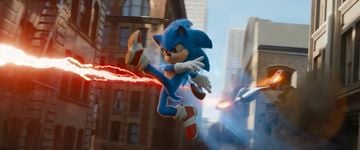
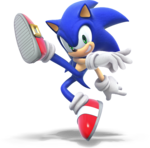
Left: Sonic doing a pose in the movie.
Right: Sonic's Super Smash Bros. Ultimate artwork that the pose is seemingly based on.
Right: Sonic's Super Smash Bros. Ultimate artwork that the pose is seemingly based on.
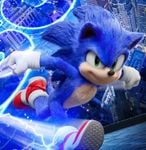
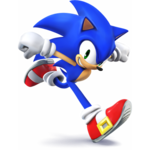
Left: Sonic's pose in one of the movie's posters.
Right: Sonic's main character artwork from Smash 4.
Right: Sonic's main character artwork from Smash 4.
- In Sonic Generations, Classic Sonic does a similar pose to Sonic's official artwork from Brawl when he gets a B Rank.
- In the 2020 film Sonic the Hedgehog, Sonic is seen making poses that are identical to his official artwork from Smash 4 and Ultimate. The most notable example is one scene where Sonic, being chased by Dr. Robotnik, performs a pose that has a striking resemblance to his official Super Smash Bros. Ultimate render, jumping and posing in similar anatomy. Another example is not in the movie, but rather one of the movie's promotional posters, where Sonic is running in a similar pose to the one seen in his Smash 4 artwork.
- The Brawl remix of Angel Island Zone is featured on the album True Blue: The Best of Sonic the Hedgehog under the name "Angel Island Zone ~SSBB Remix~". The album released on January 23rd, 2008, a week before Brawl's Japanese release. The track has also been featured in various Mario & Sonic titles, as well as Sonic at the Olympic Games; in this game, it is specifically acknowledged as a Brawl remix, being called "Angel Island Zone (SSBB Remix)".
Splatoon
- A Hero vs. Villain Splatfest was held in Splatoon 2 to celebrate the release of Super Smash Bros. Ultimate. The accompanying panel image featured 14 fighters using their artwork from Ultimate, with Kirby, Samus, Link, Donkey Kong, Mario, Fox and Pit representing the Hero team and King Dedede, Ridley, Ganondorf, King K. Rool, Bowser, Wolf, and Dark Pit representing the Villain team. The Splatfest was announced on December 5, 2018 and took place from December 15 to December 16, with the Villain team ultimately winning.
Star Fox
- In Star Fox Zero, the designs for members of Team Star Fox, including Fox McCloud and Falco Lombardi, now include a small green reticle over their right eyes; this detail originates in Fox and Falco's Brawl and SSB4 designs, rather than previous Star Fox games. According to Star Fox Zero – The Battle Begins, the visor is Slippy Toad's most recent invention. Other elements, such as a Reflector-like device worn on the hip by Fox and Falco, also appear to be drawn from the Brawl-onward Smash design.
- Also in Star Fox Zero, during the Titania Landmaster mission, Falco will quote his line from Brawl and SSB4 when he uses his Final Smash: "Personally, I prefer the air."[7]
- In Starlink: Battle for Atlas, Fox and Falco's pilot intro cutscenes feature recreations of their victory poses that originated in Melee.
Street Fighter
- In Street Fighter V's main menu, the silhouette of Ryu's SSB4 official art is used in the Casual Match box.
StreetPass Mii Plaza
- A Puzzle Swap panel based on "Super Smash Bros. for Nintendo 3DS/Wii U" was released in Japan in December 2014, and in Western regions in February 2015. The completed image depicts the starting roster. Viewing it will display character silhouettes of the starter characters moving towards the screen.
The Legend of Zelda
- The Zelda spinoff title Hyrule Warriors contains several references to the Super Smash Bros. games:
- When using the Hylian Sword or Master Sword moveset, one of Link's combos involves using a Spin Attack while ascending off the ground; gaining aerial height with the Spin Attack is otherwise an attribute unique to its Smash Bros. appearances.
- As part of her Rapier moveset, Princess Zelda's Special Technique when Focus Spirit is active involves using Nayru's Love, Farore's Wind, and Din's Fire in rapid succession. These spells from The Legend of Zelda: Ocarina of Time were used by Link in their original appearance, with Super Smash Bros. Melee being the first game to give these spells to Zelda.
- One of Sheik's combos involves a spinning kick similar to her down smash in the Smash Bros. series, an action never previously seen in the Zelda series itself.
- Ganondorf's Ocarina of Time incarnation appears in a cutscene describing Cia's backstory wielding his sword from the SpaceWorld 2000 GameCube Tech Demo. The only game released prior to Hyrule Warriors in which Ganondorf was shown using this sword in any capacity was Melee, where it appeared in his official artwork, one of his victory poses and his All-Star trophy. Also, one of Ganondorf's combos when using the Great Swords involves him performing a punch that looks very similar to the Brawl version of his neutral special, Warlock Punch.
- The usage of the names Young Link for the child-age Link from Ocarina of Time and Majora's Mask and Toon Link for the Link from The Wind Waker are identical to how they are referred to in their Smash Bros. appearances, as opposed to their home games where they are simply known as "Link".
- One of Toon Link's special moves involves him swinging his sword in a panic, and pausing to catch his breath after the move, likely as a reference to his down taunt.
- For the Twilight Princess themed costumes for Link, Zelda, and Ganondorf, Ganondorf's costume is based off the variation of his Twilight Princess outfit from Brawl. It lacks the glowing stab wound on the chest, and the cape's hemline is neither torn or tattered.
- In Cadence of Hyrule, a crossover between The Legend of Zelda and Crypt of the NecroDancer, Zelda is a playable character and her moveset is partially based on her appearances in the Smash Bros. series.
- Zelda uses Nayru's Love and Din's Fire, both of which were used by Link originally.
- Both spells are closer to their Smash functionality than their Ocarina of Time appearance.
- A figurine of Zelda by First Four Figures based on her design from Twilight Princess (which inspired her design in Brawl and SSB4) uses the color scheme of her appearance in SSB4 than in her source game (for example, the tapestry on her dress is indigo instead of gray). This also applies to the variant of her possessed form from Twilight Princess, as well.
- In Hyrule Warriors: Age of Calamity, two of Calamity Ganon's moves resemble the Warlock Punch and Flame Choke.
The Wonderful 101
- A minor Wonderful One named Wonder-Dancer has the tagline "SHOW ME YOUR MOVES!", a reference to Captain Falcon's recurring taunt in the Smash series.
Tomodachi
- R.O.B. appears as a treasure in Tomodachi Life; his description refers to it as "an official Smash brawler".
- In Miitomo, the Fusion Suit and Light Suit appear as simple palette swaps of Samus Aran's standard Varia Suit, much like her alternate costumes in the Smash series. There are also two different palette swaps, one with light pink coloration and one with dark purple coloration, that match the two different Gravity Suit-inspired costumes in Smash.
- Miitomo features green, red, and black palette swaps of the Zero Suit that match some of Zero Suit Samus's alternate costumes in the Smash series.
Undertale
- In Deltarune, the player character, Kris, can interact with their motherly figure, Toriel, and start a unique conversation referencing Super Smash Bros.. In it, Toriel reminisces of a video game that Kris and their brotherly figure, Asriel, used to play during their youth, naming it Super Smashing Fighters. She also comments on the latter's liking for the game's "green lizard", referencing Yoshi.
Wario
- WarioWare Gold supports several Smash amiibo. Wario draws a sketch of the scanned amiibo. While most amiibo depict artwork from their home series, the following character sketches are based off of their SSB4 artwork:
Yoshi

Many of the character-based skins for Yoshi in Yoshi's Woolly World are inspired by characters in SSB4.
- Yoshi's Woolly World and Poochy & Yoshi's Woolly World supports most Smash amiibo, unlocking themed costumes for Yoshi based on the scanned character. This extends to the Mii Brawler, Mii Swordfighter, and Mii Gunner, the designs of which are original to SSB4.
- Before Melee, Yoshi had only been seen turning into an egg against his will or in response to a Super Star or Turbo Tulip. Upon the Egg Roll being introduced, self-egging became a staple ability of all Yoshis, seeing appearances in Mario Power Tennis and Mario Strikers Charged.
Other franchises
Games
- Sony's PlayStation All-Stars Battle Royale is a crossover fighting game featuring several of Sony's own franchises as well as Heihachi Mishima from Tekken and other third-party characters from Metal Gear, like Raiden, and Capcom, like Dante from Devil May Cry. Most of the characters made their first appearance on the PlayStation consoles, and some of them are even exclusive, like Kratos from God of War, Nathan Drake from Uncharted, Sir Daniel Fortesque from Medievil and Ratchet & Clank from its eponymous series. The game's development team stated that Smash Bros. itself was one of their inspirations and the title is a direct reference to the series' Japanese name, Nintendo All-Star! Great Melee Smash Brothers.
- Another counterpart to the Super Smash Bros. series is Cartoon Network: Punch Time Explosion, featuring characters from several Cartoon Network shows. Several aspects from the Super Smash Bros. series, including the concept of Final Smashes and Assist Trophies, are featured in the game.
- The sixth annual Scream Fortress Halloween event for Valve Software's Team Fortress 2 introduces a set of bumper car mini-games with damage mechanics that work identically to those in Smash Bros.: players have a damage meter with a percentage that increases when hit and determines how much knockback they receive, with a major objective to knock the opponents out of the arena.
 TF2's version of the damage meter, seen on the left
TF2's version of the damage meter, seen on the left - Dead or Alive: Dimensions, developed by Team Ninja, has a Pyrosphere arena referencing the Ridley fight from Metroid: Other M, also developed by Team Ninja. This includes Ridley scraping fighters along the wall, which was a reference to Super Smash Bros. Brawl's Subspace Emissary.
- One Piece: Super Grand Battle! X, developed by Bandai Namco, includes amiibo support to unlock costumes based on Nintendo characters. As the amiibo involved in unlocking such costumes are those of Super Smash Bros. 4 playable characters, there is official artwork of One Piece characters in matching poses in the appropriate costumes. This includes Luffy as Mario and Luigi, Zoro as Link, Sanji as Fox, Nami as Wii Fit Trainer, Franky as Donkey Kong, Brook as Marth, Chopper as Kirby, Usopp as Yoshi, and Nico Robin as Samus.[8][9]
- Teenage Mutant Ninja Turtles: Smash-Up is a four-player 2.5D fighting game similar to the Super Smash Bros. series, featuring various characters, customizing options, items. Game Arts, who had previously worked on Super Smash Bros. Brawl, was the primary developer for the game.
- Kung Fu Panda: Showdown of Legendary Legends is a 4 player 2.5D brawler game like the Super Smash Bros. series, with similar elements like shield, items.[10]
- In the mobile game Family Guy: The Quest for Stuff, Fezzik and Sir Peter discuss melees during the quest "Twice Upon a Time" in the limited event "A Grimm Knight in Quahog":
- Fezzik: Peter, I'm going to teach you some hand-to-hand combat. Now, what do you do if you get into a melee?
- Sir Peter: I pick Fox, turn off items, and select Final Destination.
- Sir Peter: Sorry, I only know the word "melee" from Super Smash Bros.
- In the second season of Toys-to-Life game Lego Dimensions, one of the Level packs is based off Sonic the Hedgehog. On the packaging for the Level pack itself, Sonic says "Sonic's the name, speed's my game!", which was one of his victory quotes in Brawl.
- In the game Not a Hero, when the character completes the first level, there will be a random sequence of dialogue that plays out. One of the lines in one of the sets of dialogue has BunnyLord remark how "this one time, when I lived in the Neon Butt Club, I Falcon Punched a spoon."
- In You Don't Know Jack: Full Stream, part of The Jackbox Party Pack 5, one possible Gibberish Question is "Group Myrrh, Trash Others", which players must rhyme with "Super Smash Bros.".
- Kindergarten 2 features a highly pixelated poster of Super Smash Bros. Ultimate's box art on the protagonist's bedroom wall.
- In Jackbox Party Pack 6, one of Trivia Murder Party 2's minigames is called Mind Meld, where the players have to type in an answer of that category. One of them is "Fighters in the original Super Smash Bros."
- The Henry Stickmin collection has multiple references to Super Smash Bros. through several of its episodes.
- Escaping the Prison has an achievement called "lolbrawlreference" that is gained after tripping in the escape scene.
- In Stealing the Diamond Henry can attempt a Falcon Punch only for it not work. The original Flash version also used Captain Falcon's voice lines when selecting it.
- Infiltrating the Airship features a similar option with a Falcon Kick which backfires and burns Henry to ashes.
- Fleeing the Compound episode has Henry Dash Dancing, before smashing Ellie and Dmitri with his knee (much like Captain Falcon's forward aerial) and blasting them off the screen.
- One path of Completing the Mission has him use Fox's Reflector to reflect a beam, only to get punched off the screen, a Finishing Zoom effect, followed by a blast KO, with an announcer shouting "GAME!"
- In another path of Completing the Mission, one of the options is the Wombo Combo, ending with a Stickmin Punch.
- In another path of Completing the Mission, Henry will smash his Teleporter in frustration, causing him to warp to a bunch of places, one of them being Final Destination from Melee, but it only happens for a brief second.
- In a promotional image of the collaboration between the 2020 action game Ninjala and Sonic, Berecca (who wears a Sonic costume) strikes a pose identical to Sonic's official render in Ultimate.
Songs
Several songs center around the Super Smash Bros. series:
- "Settle It In Smash" is a rap by YouTuber Yungtown (featuring vocals from Garrett Williamson) that is themed after Super Smash Bros..
- "Smash!" by Starbomb (itself being a combination of famed YouTuber Arin "Egoraptor" Hanson and Game Grumps co-host Dan Avidan's band, Ninja Sex Party) is themed after the Super Smash Bros. series, from the perspective of Luigi (played by Dan Avidan) being introduced to the concept of Smash by an announcer (played by Mark "Markiplier" Fischbach), and wishing to not be so violent towards his friends in Smash (including Mario, Pikachu, and Fox, all played by Arin Hanson, and Samus, played by an uncredited Emily Hughs), but eventually giving in.
- "SMASH" by YouTube channel Screen Team is a song themed after Super Smash Bros.; the YouTube video of the song features the stars of the YouTube channel cosplaying as the different characters.
- "Smash Rap" by famed YouTube channel Smosh features a darker view on the series, following Mega Man fighting Zero Suit Samus, Villager, and Mario.
Other songs feature minor references to the series:
- "Astro Travelin" by Jazz references Super Smash Bros. in the line, "I'd rather run shit on that Smash Brothers, Ness whooping ass, while somebody lights the blunt up with a little bit of hash."
- "Heartbeat" by Childish Gambino also references Super Smash Bros. in the line, "Askin' him if she wanna play games with the super smash brothers, but none of them you".
- "Hey Mario" by Patent Pending references Super Smash Bros. as one of Mario’s multiple occupations in the line, "You’re a plumber, a doctor, a race car driver, an athlete, a spaceman, a Super Smash survivor".
- "Hurt" by Yung Lean references Super Smash Bros. along with several other Nintendo franchises.
- "Sex and Super Smash Bros." by KYLE repeats the lines "Sex and Super Smash Bros. / Sex and sex and Super Smash Bros." in the chorus.
Other media
- As a promotion for Super Smash Bros. 4, American comic book company Archie Comics announced that variant covers for Issue 69 of Sonic Universe, Issue 42 of Mega Man, and Issue 266 of Sonic the Hedgehog would feature a triptych based on Smash 4. The three covers respectively feature Shadow the Hedgehog, Mega Man using his down smash and Sonic the Hedgehog using his down aerial on a variant of the Boxing Ring stage, with the Mega Man cover also featuring a lenticular cover as to allow it to appear 3D.
- To commemorate the Sonic the Hedgehog series' 25th anniversary, the official Sonic the Hedgehog Twitter held a "Twitter takeover" in which Sonic and Dr. Eggman (voiced by Roger Craig Smith and Mike Pollock, respectively) answered questions from fans. One fan asked why Doctor Eggman isn't playable in the Super Smash Bros. series, and Dr. Eggman replied that he is playable, and is in fact an S-tier character, but he's so powerful that nobody's managed to unlock him yet.
- Super Smash Bros. is referenced in a sketch in the 11th episode of Season 3 of MAD called "Diary of a Wimpy Kid Icarus". Acting as a crossover between Super Smash Bros. and the children's book series Diary of a Wimpy Kid, it featured several characters from the Super Smash Bros. series, including Mega Man, and starred Pit and Kirby as unpopular high school students. At the end of the sketch, Pit and Kirby are challenged by Mega Man and his gang (of Sonic, Pikachu, and Donkey Kong) to a battle. The basketball court that they were standing on is then uprooted and flies high in the air, resembling Final Destination. As with all Super Smash Bros. matches, a narrator counts down from "3" and the fight ensues. Pit wins the fight by firing a single arrow and earns his desired popularity. This skit was premiered in September 27, 2012, predating the inclusion of Mega Man and 8-Player Smash in Smash 4.
- In the Steven Universe/Uncle Grandpa crossover episode "Say Uncle", Steven and Uncle Grandpa are seen playing an in-universe variation of Super Smash Bros. on Steven's Nintendo GameCube. The match itself is a crossover between Hopper and Tiny Miracle, two minor characters from Steven Universe and Uncle Grandpa respectively. It also uses several specific Super Smash Bros. elements such as perfect shielding, rolling and the behavior of the camera.
- In the OK K.O.! Let's Be Heroes season 1 finale "You're in Control", the TV channel Action News 52 introduces their coverage of this episodes' threat by a "New Crisis Approaching!" banner that is almost identical to the "New Challenger Approaching!" one used in Mega Man's reveal trailer. This episode also coincidentally introduces Boxman Jr., a parody of Bowser Jr. (being the "son" of main antagonist Boxman) and fighting in a flying contraption inspired by the Junior Clown Car (complete with punching gloves and buzz saws).
- The two continuities of the Love, Chunibyo & Other Delusions franchise each have a different verbal mention of Super Smash Bros.:
- On pages 68-69 of the first volume of the light novel series, Yuuta and Rikka debate over the name of an otherwise unnamed video game, with Yuuta insisting that the game is called "Sumabura", a Japanese abbreviation of Smash Bros.
- In the original Japanese version of the fifth episode of the first season of the anime, at the 7:40 time stamp, Yuuta compares Rikka's embarassment at having inferior math skills to her "servant" Dekomori to being up at 300% damage in Smash Bros. The words "Smash Bros." are partially bleeped out from the dialog for copyright reasons. The English dub changes the Smash Bros. analogy to a generic analogy of a player losing all their lives in an arcade game at once.
- In chapter 114 of the manga Nisekoi, Ruri Miyamoto and her grandfather are seen playing Super Smash Bros. Brawl on a Wii with a GameCube controller look-alike; the match shown on the screen depicts a Meta Knight look-alike fighting Ganondorf on Final Destination.
- The season four finale of the Comedy Central sitcom Workaholics, "Friendship Anniversary", sees the main trio of Adam, Blake, and Ders have their house infested by rats--whom they proceed to massacre. Blake sneaks up on one rat, screams "FALCON PUNCH!" and then punches it to death.
- In chapter 93 of the manga YuruYuri and episode 2 of the OVA YuruYuri Nachuyachumi!+, Yui Funami and Kyoko Toshinou play a game called Namo Bros., a clear imitation of Super Smash Bros. for Nintendo 3DS named after the manga's author Namori. Many elements of that game appear, including a stage based closely on Battlefield, rolling, KO explosions, a meteor smash resembling Mario's forward aerial, screen KO, shield and the Hammer item.[11]
- Smash Bros. is referenced in the movie Zathura, where Danny asks his dad to play Smash Bros. Oddly enough, Danny is holding a PlayStation 2 controller.
- A kitten can be seen in a commercial for Petco tapping a Wii U gamepad, with Super Smash Bros. being played on it.
- In episode 2 of the Despair Arc of Danganronpa 3: The End of Hope's Peak High School, Chiaki Nanami, Nekomaru Nidai, Akane Owari, and Gundham Tanaka are all seen playing a video game which very clearly serves as an in-universe stand-in for Smash 64. Of note is that one of the characters in said game looks strikingly similar to Donkey Kong.
- During the opening sequence for every episode in Gamers!, several video games are referenced, including Super Smash Bros. for Wii U, right down to its in-game HUD. On a stage based closely on Battlefield, main characters Keita and Aguri are fighting, Keita being at 172% and Aguri being at 83%. Keita charges at Aguri, swiping his claw at her, only for her to roll and counter with a move similar in appearance and function to Shield Breaker and Flare Blade combined, launching Keita and KOing him.
- Robot Chicken did a whole sketch about Super Smash Bros. (by way of also parodying the Hunger Games book series with a female Villager - alternate costume #1 - playing Katniss Everdeen's role) in the 4th episode of Season 9, "Things Look Bad for the Streepster".
- The fourth episode of Forged in Fire: Knife or Death is named after the series itself.
- One of the comics by Retail, dated December 7, 2018, shows a grandparent looking to buy Super Smash Bros. Ultimate for their kid. That date is also the day Super Smash Bros. Ultimate was released.
- In chapter 76 of the manga My First Girlfriend Is a Gal, the main male cast is seen playing Super Smash Bros. Ultimate, with one panel showing a character resembling Ness getting hit by a character resembling Captain Falcon at 158%, and the panel immediately after showing two of the three of them using Joy-Cons in the Joy-Con Grip.
- Kurt Snyder, a storyboard artist for the Nickelodeon show SpongeBob SquarePants, tweeted a drawn picture in August of 2019 for Nickelodeon Studio’s Super Smash Bros. Ultimate tournament featuring Nickelodeon characters as Super Smash Bros. Ultimate characters; the picture was later updated the following month to include even more characters. The entire list of characters seen in the picture, and which characters they are referencing, can be seen here.
- In the Season 2 episode "Hopping Mall" of the Disney Channel animated series Amphibia, Anne Boonchuy and Sprig Planter team up to compete in Newtopia's Smash n' Mash derby (where contestants in teams of two must try to knock each other out in shopping carts) to win a butterfly teapot as a gift for Anne's mother back on Earth. In one of the scenes, Sprig used his staff (which was a gift for Ivy Sundew back in Wartwood) to block an attack from one of their competition (in reference to the perfect shield mechanic in Ultimate) and launch them out of the screen, complete with the Deadly Blow-like effect and the Blast KO-like effect to which Anne replied, "He's fine." [12]
- In chapter seven (part 1) of the Manga Plus series Hokkaido Gals Are Super Adorable!, the characters Akino and Tsubasa are playing Super Smash Plus+, a reference to Super Smash Bros. Ultimate. The game includes various characters from other Manga Plus series.
- In the fifth episode of the anime adaptation of the Jujutsu Kaisen manga, Nobara Kugisaki is asked by her seniors to participate in an event. She asks if Smash Bros. is a thing there, later adding she won't lose if it is the Wii version. She even mentions the using the Meteor Smash technique.[13]
References
- ^ [1]
- ^ https://twitter.com/DQSB_PR/status/1198511571162390528
- ^ [2]
- ^ [3]
- ^ [4]
- ^ [5]
- ^ [6]
- ^ [7]
- ^ [8]
- ^ Kung Fu Panda: Showdown of Legendary Legends Launch Trailer - Little Orbit
- ^ Yuru Yuri Nachuyachumi!+ 02 - Smash Brothers
- ^ https://twitter.com/AmphibiaMedia/status/1304827112193437696
- ^ Jujutsu Kaisen

